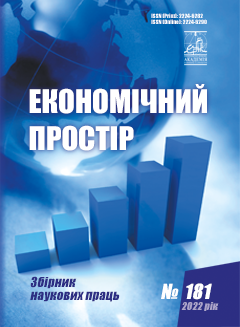SHADOW ECONOMY IN THE GLOBAL ENVIRONMENT: COMPREHENSIVE STUDY OF FACTORS
Abstract
Awareness of the growing impact of the shadowing of economic activity on the scale and structural parameters of the world economy objectively requires a comprehensive study of the system of factors that determine its nature, preconditions and vector orientation in the context of global economic development. We believe that the combination of these factors of political, legal, economic, socio-cultural and informational-communicative nature essentially form the environment for the functioning of the shadow sector of the global economy. It is a kind of "aura" that accompanies and mediates the shadow business transactions of economic entities of different nationalities, as well as in specific historical conditions and spatio-temporal boundaries forms the scale and main directions of shadowing of economic activity. In other words, its global environment is represented by quantitative and qualitative factors that have a decisive influence on the motivation of economic entities to implement shadow business operations, the state and value of shadow transactions, the development of corporate strategies and business models of shadowing, and cause the most significant shifts in the structure of world production and employment. At the same time, another important circumstance cannot be overlooked: the general vector of shadowing of financial and economic operations of economic entities is formed in modern conditions both on the basis of objective economic laws and as a result of systemic influence of global trends of world economic development. nonlinear and emergent factors of civilizational social progress. It should also be noted that while the pre-globalization stage of the world economy was characterized by the dominant one-vector influence of the exogenous environment on the processes of shadowing economic activity, global conditions determine the formation of a qualitatively new - dialectically-mutually determined - model of shadow economy. It is characterized, on the one hand, by the strong influence of the global environment on the activities of shadow business structures with a significant diversification of factors taken into account in the development and implementation of corporate strategies and business models, and on the other - by deep structuring of the shadow economy. compliance with their own economic interests and operational and strategic objectives.
References
World Population Ageing 2020 Highlights. UN. Department of Economic and Social Affairs. Available at: https://www.un.org/development/desa/pd/sites/www.un.org.development.desa.pd/files/files/documents/2020/Sep/un_pop_2020_pf_ageing_10_key_messages.pdf (accessed 22 January 2021)
Zillman C. Women’s Representation in the Workforce May Never Equal Men’s. Fortune, 31.01.2017. Available at: https://fortune.com/2017/01/31/women-workforce-labor-force/ (accessed 22 January 2021)
Tooss M. Labor Force Change, 1950–2050. A century of change: the U.S. labor force, 1950–2050. Available at: https://www.bls.gov/opub/mlr/2002/05/art2full.pdf (accessed 22 January 2021)
Marilyn С., Chen M. A. (2001) Globalization and the informal economy: how global trade and investment impact on the working poor. WIEGO, May. Available at: https://www.ilo.org/wcmsp5/groups/public/---ed_emp/documents/publication/wcms_122053.pdf (accessed 22 January 2021)
Number of high net worth individuals worldwide from 2010 to 2018, by region (in millions). Statista. The Statistics Portal. Available at: https://www.statista.com/statistics/263488/millionaires-worldwide-by-region/ (accessed 22 January 2021)
Global Wealth 2020: The Future of Wealth Management. 20th Edition. A CEO Agenda. Boston Consulting Group, June 2020.
Hazans M. (2011) Informal Workers Across Europe: Evidence from 30 Countries. IZA DP, No. 5871, July. Available at: http://ftp.iza.org/dp5871.pdf. (accessed 22 January 2021)
Shaxson N. (2019) Tackling Tax Havens. Finance & Development. Vol. 56. No. 3. Available at: https://www.imf.org/external/pubs/ft/fandd/2019/09/tackling-global-tax-havens-shaxon.htm (accessed 22 January 2021)
Azevêdo: E-commerce must be a force for inclusion. Available at: https://www.wto.org/english/news_e/spra_e/spra264_e.htm (accessed 22 January 2021)



